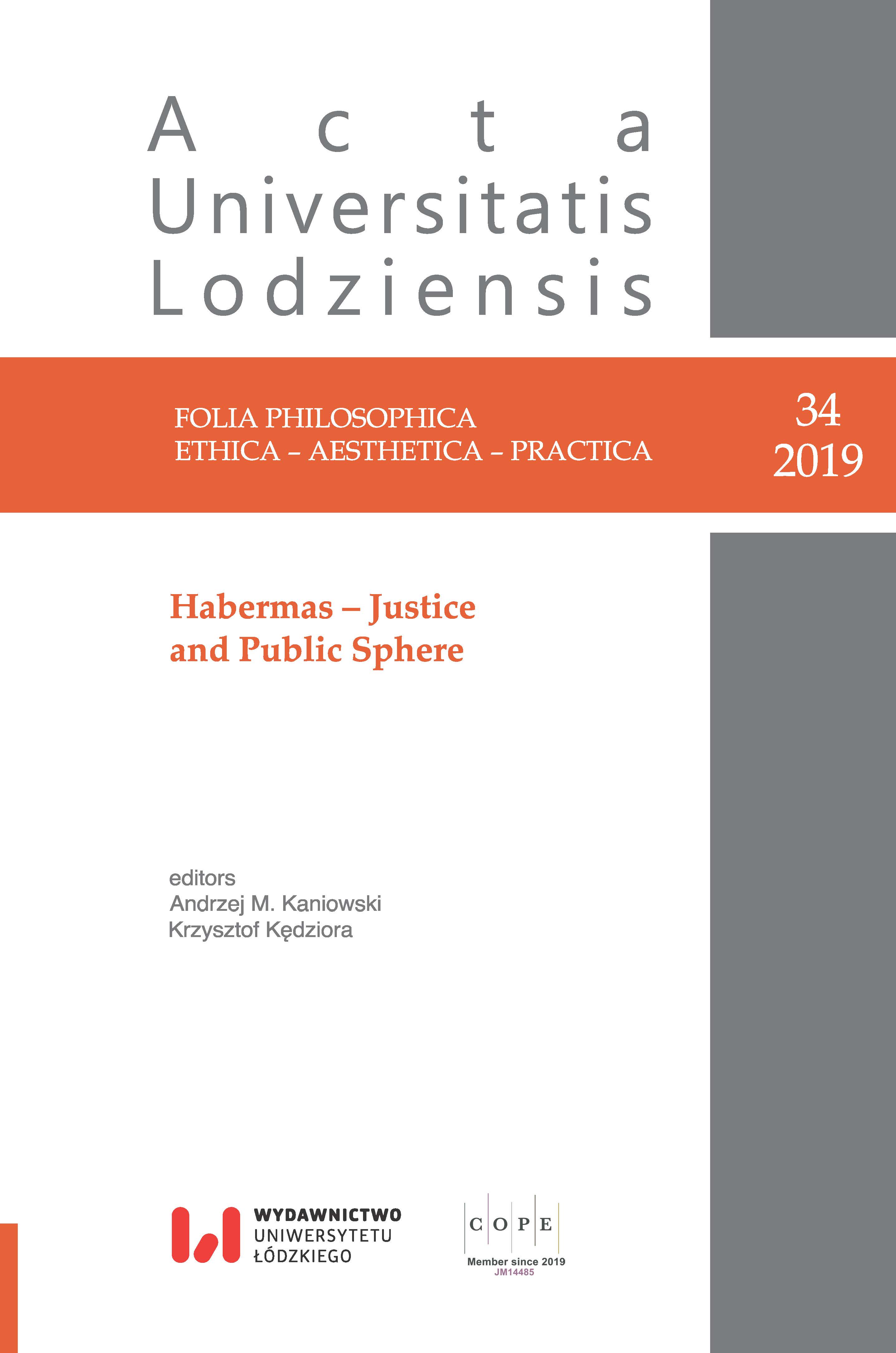Habermas and Rawls on an Epistemic Status of the Principles of Justice
DOI:
https://doi.org/10.18778/0208-6107.34.03Słowa kluczowe:
Habermas, Rawls, principles of justice, justification, validityAbstrakt
The so-called debate between Jürgen Habermas and John Rawls concentrated mainly on the latter’s political liberalism. It dealt with the many aspects of Rawls’s philosophical project. In this article, I focus only on one of them, namely the epistemic or cognitivistic nature of principles of justice. The first part provides an overview of the debate, while the second part aims to show that Habermas has not misinterpreted Rawls’s position. I argue that Habermas rightly considers Rawls’s conception of justice as a moral one. In the last part, I discuss two key questions raised by Habermas. The first concerns the relation between justification and acceptance of the principles of justice. The second concerns the relation between two validity terms: truth and reasonableness.
Bibliografia
Boettcher, James W. “What is Reasonableness?” Philosophy & Social Criticism 30, no. 5–6 (2004): 597–621, https://doi.org/10.1177/0191453704045756
Google Scholar
DOI: https://doi.org/10.1177/0191453704045756
Finlayson, James Gordon. The Habermas-Rawls Debate. New York: Columbia University Press, 2019.
Google Scholar
DOI: https://doi.org/10.7312/finl16410
Finlayson, James Gordon, and Fabian Freyenhagen. “Introduction: The Habermas-Rawls Dispute – Analysis and Reevaluation.” In Habermas and Rawls: Disputing the Political, edited by James Gordon Finlayson and Fabian Freyenhagen, 1–21. New York: Routledge, 2011.
Google Scholar
Forst, Rainer. “Discourse Ethics.” In The Habermas Handbook, ed. Hauke Brunkhorst, Regina Kreide, and Cristina Lafont, 538–540. New York: Columbia University Press, 2018.
Google Scholar
DOI: https://doi.org/10.7312/brun16642-055
Gledhill, James. “Procedure in Substance and Substance in Procedure. Reframing the Rawls-Habermas Debate.” In Habermas and Rawls: Disputing the Political, edited by James Gordon Finlayson and Fabian Freyenhagen, 181–199. New York: Routledge, 2011.
Google Scholar
Habermas, Jürgen. Between Facts and Norms: Contributions to a Discourse Theory of Law and Democracy. Translated by William Rehg. Cambridge, MA: The MIT Press, 1996.
Google Scholar
DOI: https://doi.org/10.7551/mitpress/1564.001.0001
Habermas, Jürgen. The Inclusion of the Other: Studies in Political Theory. Translated by Ciaran Cronin. Cambridge, MA: The MIT Press, 1998.
Google Scholar
Habermas, Jürgen. Justification and Application: Remarks on Discourse Ethics. Translated by Ciaran Cronin. Cambridge, MA: The MIT Press, 1993.
Google Scholar
Habermas, Jürgen. Moral Consciousness and Communicative Action. Translated by Christian Lenhardt and Shierry Weber Nicholsen. Oxford: Polity Press, 1990.
Google Scholar
Habermas, Jürgen. “Reconciliation Through the Public Use of Reason: Remarks on John Rawls’s Political Liberalism.” The Journal of Philosophy 92, no. 3 (March 1995): 109–131, https://doi.org/10.2307/2940842
Google Scholar
DOI: https://doi.org/10.2307/2940842
Habermas, Jürgen. “Reply to My Critics.” In Habermas and Rawls: Disputing the Political, edited by James Gordon Finlayson and Fabian Freyenhagen, 283–304. New York: Routledge, 2011.
Google Scholar
Heat, Joseph. “Justice. Transcendental not Metaphysical.” In Habermas and Rawls: Disputing the Political, edited by James Gordon Finlayson and Fabian Freyenhagen, 117–134. New York: Routledge, 2011.
Google Scholar
Kant, Immanuel. The Metaphysics of Morals. Translated by Mary Gregor. New York: Cambridge University Press, 1991.
Google Scholar
Laden, Anthony Simon. “The Justice of Justification.” In Habermas and Rawls: Disputing the Political, edited by James Gordon Finlayson and Fabian Freyenhagen, 135–152. New York: Routledge, 2011.
Google Scholar
McMahon, Christopher. “Habermas, Rawls and Moral Impartiality”. In Habermas and Rawls: Disputing the Political, edited by James Gordon Finlayson and Fabian Freyenhagen, 200–223. New York: Routledge, 2011.
Google Scholar
Rawls, John. A Theory of Justice. Cambridge, MA: The Belknap Press, 1971.
Google Scholar
Rawls, John. “The Idea of an Overlapping Consensus.” In Collected Papers, edited by Samuel Freeman, 421–448. Cambridge, MA: Harvard University Press, 1999.
Google Scholar
Rawls, John. “The Idea of Public Reason Revisited.” In Political Liberalism: Expanded Edition, 435–490. New York: Columbia University Press, 2005.
Google Scholar
Rawls, John. Justice as Fairness. A Restatement. Cambridge, MA: The Belknap Press, 2001.
Google Scholar
Rawls, John. “Political Liberalism: Reply to Habermas.” The Journal of Philosophy 92, no. 3 (March 1995): 132–180, https://doi.org/10.2307/2940843
Google Scholar
DOI: https://doi.org/10.2307/2940843
Rorty, Richard. “The Priority of Democracy to Philosophy.” In Objectivity, Relativism, and Truth: Philosophical Papers, 175–196. New York: Cambridge University Press, 1991.
Google Scholar
Weithman, Paul. Why Political Liberalism? On John Rawls’s Political Turn. New York: Oxford University Press, 2010.
Google Scholar
DOI: https://doi.org/10.1093/acprof:oso/9780195393033.001.0001
Wuerth, Julian. Kant on Mind, Action, and Ethics. New York: Oxford University Press, 2014.
Google Scholar
DOI: https://doi.org/10.1093/acprof:oso/9780199587629.001.0001
Pobrania
Opublikowane
Jak cytować
Numer
Dział
Licencja

Utwór dostępny jest na licencji Creative Commons Uznanie autorstwa – Użycie niekomercyjne – Bez utworów zależnych 4.0 Międzynarodowe.












